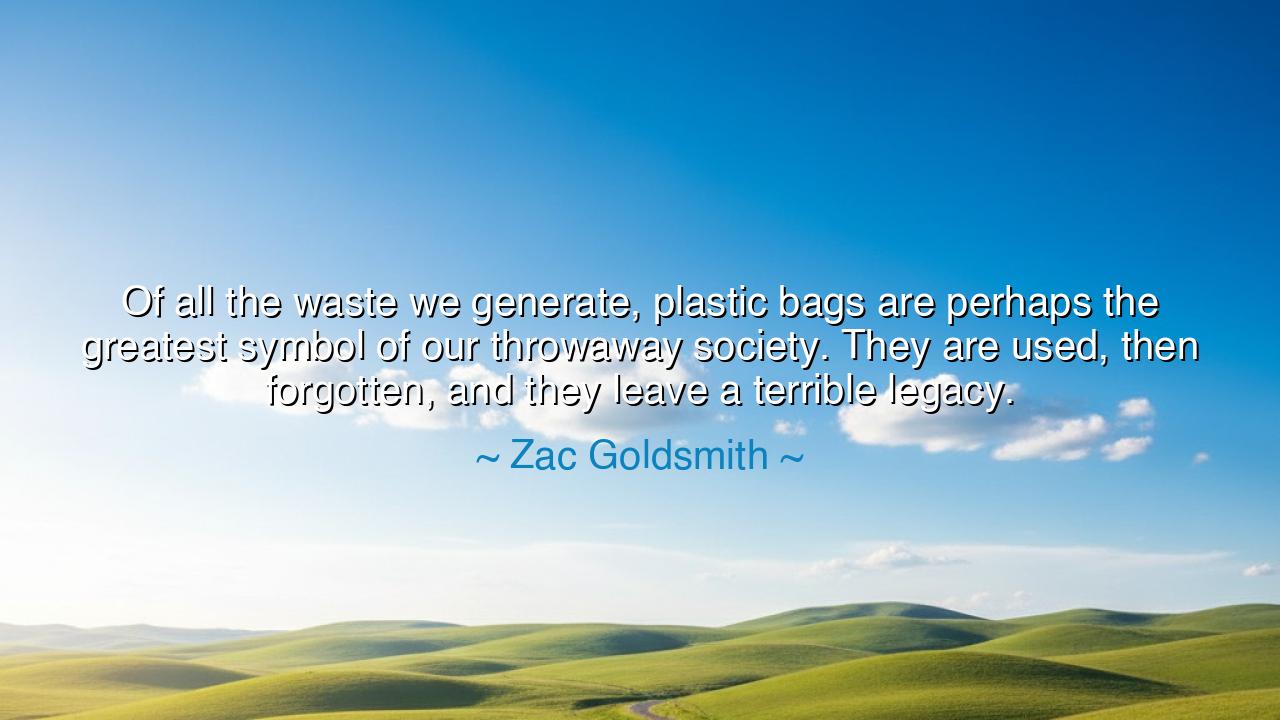
Of all the waste we generate, plastic bags are perhaps the
Of all the waste we generate, plastic bags are perhaps the greatest symbol of our throwaway society. They are used, then forgotten, and they leave a terrible legacy.






In the vast expanse of the earth, where once nature thrived in its unspoiled majesty, we now stand amidst the ruins of our own creation. The words of Zac Goldsmith pierce the heart of our modern existence: “Of all the waste we generate, plastic bags are perhaps the greatest symbol of our throwaway society. They are used, then forgotten, and they leave a terrible legacy.” These words are not merely a reflection of the present moment, but a lamentation—a cry for a world lost to recklessness, where disposable things are valued above that which is lasting and sacred.
The humble plastic bag is but a small object in the grand scheme of things, yet it embodies the deepest flaws of our age. It is used once, perhaps twice, and then discarded, without thought, without care. It is emblematic of our approach to life: to consume, to use, and to forget. We have become a society that throws away that which no longer serves us, whether it be an object, a relationship, or a moment of meaning. The plastic bag, in its disposable nature, represents our failure to recognize the long-term consequences of our actions. It is but a small symbol of a larger truth—a truth that echoes through the ages, urging us to reflect upon the legacy we leave behind.
Consider, if you will, the ancient civilizations that once flourished. The Romans, the Greeks, and the Egyptians—their achievements have endured for millennia because they understood the importance of lasting value. They built monuments, crafted works of art, and established institutions that sought not to serve the fleeting needs of the moment, but to endure through the ages. Their legacy was not one of disposability, but of creation—creation that served not only their generation but future generations. Their work was not a reflection of a society that consumed and discarded, but one that crafted and built with foresight and wisdom. It is this wisdom that we, in our modern age, have forgotten, as we have chosen plastic over stone, convenience over sustainability, and disposable goods over enduring craftsmanship.
Yet, despite the humble plastic bag seeming small in comparison to the grand works of the ancients, it carries a lesson with it that should stir the very soul. The legacy it leaves is not one of beauty or endurance, but one of destruction. These small, seemingly innocent items—discarded carelessly into the world—are not biodegradable. They accumulate in the land, in the oceans, and in the hearts of the earth, like an unhealed wound that festers with each passing day. The legacy of the plastic bag is one of pollution, of harm to the natural world, and of a world that has forgotten the very meaning of stewardship and care. The terrible legacy left by these bags is the visible reminder of our failure to look beyond our immediate desires and consider the long-term impact of our actions.
The story of the ancient Greeks, who saw themselves as caretakers of the land and the sea, offers a profound contrast to the way we treat the earth today. They believed in the principle of symbiosis, that humans should live in harmony with nature, not as conquerors, but as protectors. In their mythology, Gaia, the spirit of the Earth, was revered and respected, for she was the source of all life. To harm the earth was to harm oneself. In their time, they understood that every action—every decision—echoed across time, leaving either a legacy of balance or a legacy of destruction. Imagine what they would say today, looking upon the plastic bags scattered across the land, as symbols of our neglect of the very world that sustains us.
Now, the lesson is ours to learn. The plastic bag, in its seemingly insignificant form, calls us to confront the great moral failing of our time: our inability to value that which is lasting over that which is immediate. It is a call to reject the throwaway culture that has taken root in our societies, to look beyond the convenience of temporary solutions, and to consider the future generations who will inherit the consequences of our actions. Just as the ancient civilizations created works that were meant to endure, we, too, must create a legacy of care, sustainability, and respect for the earth.
The time for action is now. We must change our mindset—from one of disposability to one of reverence. Let us walk the earth with the understanding that every plastic bag we discard is not just waste—it is a symbol of the wastefulness of our society, a reminder that we must change our ways. Choose wisely, choose sustainably, and choose to value the earth and all its creatures. In doing so, we will leave behind a legacy worthy of our place in the great tapestry of time—one that future generations will look upon not with regret, but with gratitude.






AAdministratorAdministrator
Welcome, honored guests. Please leave a comment, we will respond soon